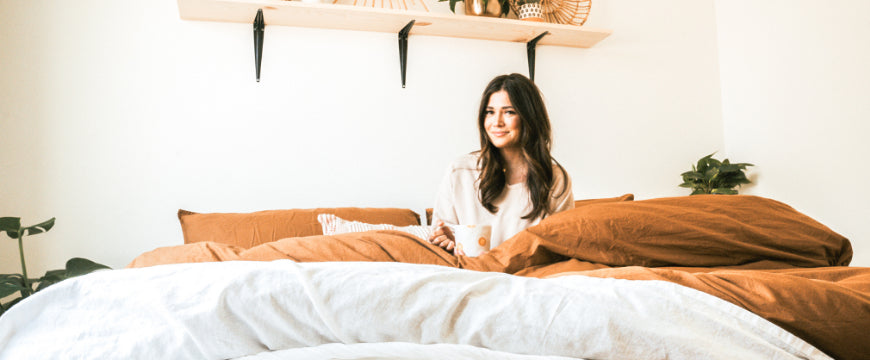How much water should you drink to properly sleep?
Or, for the frequent urinators — how little water? What’s the balance between being properly hydrated without frequent bathroom trips?
Even if nighttime bathroom trips are annoying, forgoing water before bedtime altogether isn’t the answer. Your body’s still replenishing itself while you sleep, and it needs the power of hydration for that. Dehydration might make you feel more tired and ready to sleep, but it isn’t worth it in the long run. Its consequences include dry skin, cramping, fatigue, brain fog, etc. Its effect on dry skin means that enough dehydration will be visible on your face!
Being sleep-deprived is even correlated with being more dehydrated. Part of the reason may be because the circadian rhythm, which we typically associate with sleeping and waking, regulates your hydration levels. Part of that is its regulation of vasopressin, a hormone that promotes water retention.
When you’re sleeping, you aren’t drinking anything, and your body doesn’t have any way to significantly up its hydration. However, it’s still losing hydration through breathing.
So how should you navigate the relationship between sleep and hydration?
First of all, it’s key to maintain hydration throughout the day. Do whatever it takes to remind yourself to drink those eight glasses of water, whether it’s setting a timer or filling up a large jug. Put in some flavor drops in your water to make it a bit more irresistible and tasty. When you eat, go for foods with higher moisture content.
However, you don’t want to be getting up for bathroom breaks when you’re trying to lay still and sleep. That means you should try to limit your water consumption as bedtime draws near. Don’t drink huge jugs of water that’ll have you rushing to the bathroom minutes after being tucked in. Sip small glasses if you’re thirsty. Don’t drink any alcohol or caffeine, and pee right before bed even if you don’t think you need to! Don’t forget that alcohol is a diuretic, which means it stimulates those bathroom trips.
If you sweat a lot at night, you’re losing more of that retained water. See if lowering your room temperature can make a difference. Frequent breathing through your mouth is also gradually dehydrating as well, so try to practice different breathing patterns throughout the day.
Those of you who exercise a lot throughout the day, especially if your sweat sessions are close to bedtime: you already know you need that extra hydration. But if gulping up those gallon jugs are making you run to the bathroom too frequently, gradually cut back to a dose that’s still satisfying.
